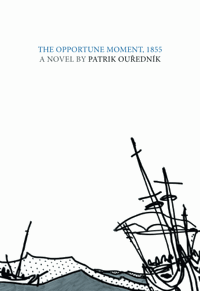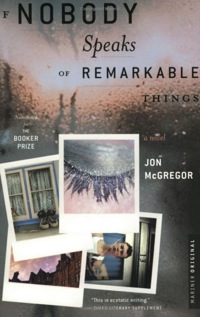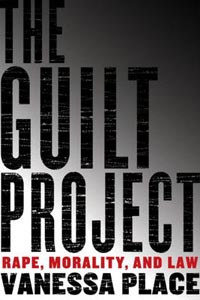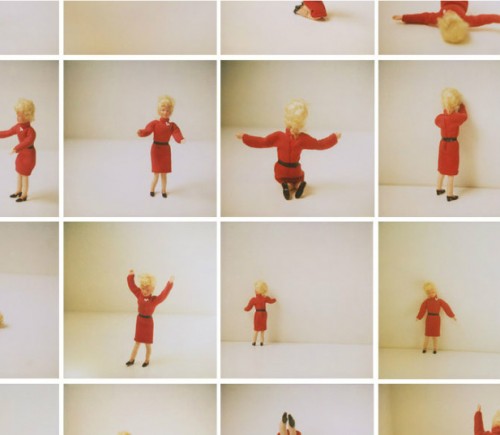The Opportune Moment, 1855
 The Opportune Moment, 1855
The Opportune Moment, 1855
by Patrik Ouředník
Dalkey Archive Press, 2011
120 pages / $12.95 Buy from Dalkey Archive Press
Rating: 8.5
Dull is the immediate word for The Opportune Moment, 1855, but not a dullness on Patrik Ouředník’s part, nor on the book’s. Bruno, whose journal comprises the greater part of the book, doesn’t seem like much of an anarchist. His interior life is full of lust for one of the women on his ship to Brazil, vivid dreams about his dead mother, and his confusion over the anarchist’s notion of “freedom” (“And how can I tell whether I’m free?”) sounds very similar to the confusion of an acolyte or seminarian. This he has in common with his fellow anarchist from 1905, whose polemical jilt-letter to his ex-girlfriend, decades after she refused him, starts the book. That writer (incidentally the one who sent Bruno & Co. to Brazil) mentions a journal, “given me by the police officer charged with the investigation” into the demise or disbandment of anarchist settlers of Paraná. The cop couldn’t care less.
August 11th, 2011 / 12:06 pm
Palo Alto
 Palo Alto
Palo Alto
by James Franco
Scribner, 2011
224 pages / $14.00 Buy from Powell’s
Rating: 5.4
Last week, the Guardian posted their longlist for the year’s best first book award, an award carrying a prize worth £10,000. Afterwards they asked booksellers and bloggers to submit their nominations. In response, Elizabeth Baines posted an article citing her own list of books she felt were missing, one of which was James Franco’s debut story collection Palo Alto, recently published in paperback.
August 10th, 2011 / 12:06 pm
Today the New York Times tells us everything is going to be okay. That’s not quite what they say, but there are signs of growth in all markets. The adult fiction market, in particular, showed strong growth and e-books are doing pretty well so maybe this writing thing is going to work out, after all. Good news in publishing. Imagine that.
If Nobody Speaks of Remarkable Things
 If Nobody Speaks of Remarkable Things
If Nobody Speaks of Remarkable Things
by Jon McGregor
Mariner Books, 2003
275 pages / $13.95 Buy from Powell’s
Rating: 7.3
It’s been close to a decade since Jon McGregor wrote his debut novel If Nobody Speaks of Remarkable Things, published when he was twenty-six. He was the youngest and only first-time novelist to be long-listed for the Booker Prize, and he won both the Betty Trask Award and the Somerset Maugham Award.
August 9th, 2011 / 12:06 pm
Power Quote: Andreas Huyssen

In traditional bourgeois culture the avantgarde was successful in sustaining difference. Within the project of modernity it launched a successful assault on 19th-century aestheticism, which insisted on the absolute autonomy of art, and on traditional realism, which remained locked into the dogma of mimetic representation and referentiality. Postmodernism has lost that capacity to gain shock value from difference, except perhaps in relation to forms of a very traditional aesthetic conservatism. The counter-measures the historical avantgarde proposed to break the grip of bourgeois institutionalized culture are no longer effective. The reasons that avantgardism is no longer viable today can be located not only in the culture industry’s capacity to co-opt, reproduce, and comodify, but, more interestingly, in the avantgarde itself. Despite the power and integrity of its attacks against traditional bourgeois culture and against the deprivations of capitalism, there are moments in the historical avantgarde which show how deeply avantgardism itself is implicated in the Western tradition of growth and progress.
–Andreas Huyssen – After The Great Divide: Modernism, Mass Culture, Postmodernism (Indiana University Press, 1986)
An Analysis of Action Bronson’s “Brunch”
If you’re at all familiar with independent music and hip hop, chances are you’ve been hearing a lot about Action Bronson this summer. Hailing from Flushing, Queens, the Albanian-American chef’s debut record Dr. Lecter was received with universal acclaim with its slick, sometimes self loathing, sometimes violent, other times just straight clever rhymes, not to mention his numerous comparisons to Ghostface Killah. Along with the album came a number of music videos, the most memorable of which I’ve chosen to break down with you today.
The video opens with the line “know you broke my heart [something] when you said goodbye to me” coupled with the image of fat being trimmed away from a cut of raw meat. The meat (“carne” in Spanish) represents the carnality of love. As it is trimmed away, then spiced, such is the speaker’s heart and soul cut open, salt rubbed into the wounds. Here, an unconscious woman is revealed in the foreground of Action’s cooking. The literal death of a once meaningful relationship.
On The Guilt Project: Rape Morality and Law & Tragodía 1: Statement of Facts by Vanessa Place
 The Guilt Project
The Guilt Project
by Vanessa Place
Other Press, 2010
336 pages / $25 Buy from Amazon
&
Tragodía 1: Statement of Facts
by Vanessa Place
Blanc Press, 2010
430 pages / $45 (HB), $25 (PB) Buy from Blanc Press
Among the individuals in Los Angeles who are responding to heavyweight issues exists an uncanny force: Vanessa Place. A criminal defense attorney, she defends what some categorize as the lost, the wretched: indigent criminals, repeat sex offenders and violent predators. Some criminals learn valuable lessons while incarcerated; others leave prison refueled, angry and ready to re-enter what’s left of the world as a less worthy version of themselves, less interested in following pre-ordained rules. This is where Place steps in: the blurry space between offense and re-offense, perpetrator and victim, right and wrong, ethics and morality. Place explains, “I work as a combination street sweeper and factory worker. I follow what’s gone before, mopping up after the bloody mess, squaring the legal corners, assembling the lives disassembled by tragedy, and reducing reams of paper to bite-sized pellets.”(p.2)
August 8th, 2011 / 12:00 pm
Would You Keep Writing If No One Was Ever Going To Read Your Work Ever Again?
 Some thoughts on this question.
Some thoughts on this question.
1. When posed to a musician friend of mine, he thinks for a while and looks serious and sad, like we’ve just seen a small animal die. Then he says, “I think I would still make music but it would sound much different.” Then he says, “Lets go get ice cream.”
2. We talk a lot about the work being the reward in itself and that’s true because I think having the time to write can feel sometimes really exciting, but it’s also really grim and lonely and makes me angry, morose, anxious, etc. And yet I keep doing it and I feel like my life depends on whether or not I get enough time to work in any given week.
3. One of the most awesome things ever is finding out that a story you published was read and enjoyed and understood by someone, but we don’t talk about the underside to this– that others may have read it and felt disconnected, isolated, ambivalent. I don’t think you can help but think about those people sometimes and feel sad about it.
4. The publishing high lasts about fourteen seconds for me. Then the anxiety about all the stuff I haven’t finished comes back.
5. For the five-ish hours I ideally get to spend writing, I get about twenty cumulative minutes of sincere satisfaction with a specific sentence, passage or phrase and the rest of the time is spent being mildly irritated that I can’t get that sincere satisfaction to stay.
6. Maybe people who make shit really just want to be alone and then for people to later come along and appreciate the product of their aloneness. Maybe this is a way to confirm that being human and necessarily isolated in your own body and mind is ok.
7. Everything I wrote from when I was a little kid (maybe 7) until I was about 20 was for myself. I didn’t want anyone to read it at all. It was its own reward. I wanted to become a psychologist and I never wanted to publish anything. Then I started wanting to publish stuff and then the writing became much more anxious and every paragraph seemed crucial to something.
8. I would keep writing if no one was ever going to read what I had written but I think I’d have to find some other outlet for myself– some creative endeavor or occupation that made me feel like I was reaching someone with something authentic. Writing would become a totally different habit, and I’d probably write less. I would need to read more, too.
Late Night Links
Flip Zembowicz has created an interactive character map for A Visit From The Goon Squad. I happened to read this book today so it was fun to stumble across this (via Sarah Malone).
Speaking of Jennifer Egan, she recommends sixty books that have been critical to her in some way.
If you were ever curious about what literary characters throughout history might wear today, there’s a site for that.
The list of panels accepted for AWP has been released.
Tom Lutz’s essay, Future Tense, at the Los Angeles Review of Books, is well worth the read.
Kathy Fish’s Wild Life is available for pre-order by Matter Press.
In the August issue of Bookslut, Elizabeth Buchner writes about reading humiliation.

